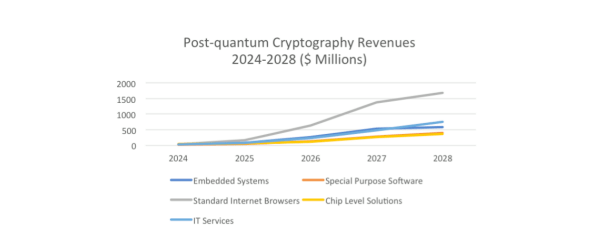Market for Post-Quantum Cryptography Software and Devices to Reach $3.9 billion by 2028

Crozet, VA According to “Post-Quantum Cryptography: A Ten-Year Market and Technology Forecast,” a new report from Inside Quantum Technology, the market for post-quantum cryptography (PQC) software and devices will ramp up dramatically as quantum computers become capable of breaking popular public-key encryption algorithms. PQC refers to techniques using software algorithms to encrypt messages on a classical computer in a manner that is resistant to being broken by quantum computers. Revenues from PQC products will reach $145 million by 2014 jumping to $3.8 billion by 2028 as the quantum threat becomes more apparent. Inside Quantum Technology is the only industry analyst firm that specializes in tracking and forecasting the quantum technology market.
More on this report can be found by clicking here at Product Post-Quantum Cryptography Ten-Year Forecast.
ABOUT THE REPORT:
“Post-Quantum Cryptography: A Ten-Year Market and Technology Forecast,” is the first industry analysis report to quantify the business opportunities from PQC products. The report includes granular 10-year forecasts with breakouts by application and product type and provides coverage of both hardware and software. The report includes discussion of lattice-based cryptography, hash-based schemes, elliptic curve isogenies, multivariate cryptography, and code-based cryptography, as well as hybrid solutions and the trade-off between PQC and QKD.
FROM THE REPORT:
• The largest market for PQC will eventually be standard web browsers, simply because there are so many browsers in cell phones and personal computers. Here PQC will replace the current RSA and Diffie-Hellman algorithms in use today and will be easy to upgrade. By 2026 PQC revenues generated by browsers will reach almost $650 million. However, early PQC revenues in the browser segment will use hybrid classical/PQC algorithms and browsers will be able to select the appropriate encryption algorithm to use depending on the site.
• The financial sector is particularly vulnerable to attack, since large sums of money are obtained in a successful hack. Cryptocurrencies — Bitcoin, Ethereum and the others – use classical public key algorithm and will need to convert to PQC to stay to stay safe. Already, two quantum resistant cryptocurrencies — Mochimo and QRL have been released and others are in development. By 2026 revenues from PQC products sold into the financial services will reach almost $300 million
• While PQC is mostly implemented in software, for certain embedded systems, a hardware approach may be preferable because these applications do not typically have available a powerful main processor that can implement the full algorithm in software. Some organizations are working to implement the algorithms either using a dedicated ASIC chip or else using an FPGA. Infineon has developed a contactless smart card chip that implements the NewHope algorithm. By 2026, chip-level PQC solutions will generate $120 million.
MORE ON INSIDE QUANTUM TECHNOLOGY:
For more details on Inside Quantum Technology and on our upcoming March conference contact:
Lawrence Gasman
lawrence@insidequantumtechnology.com
(434)825-1311



















